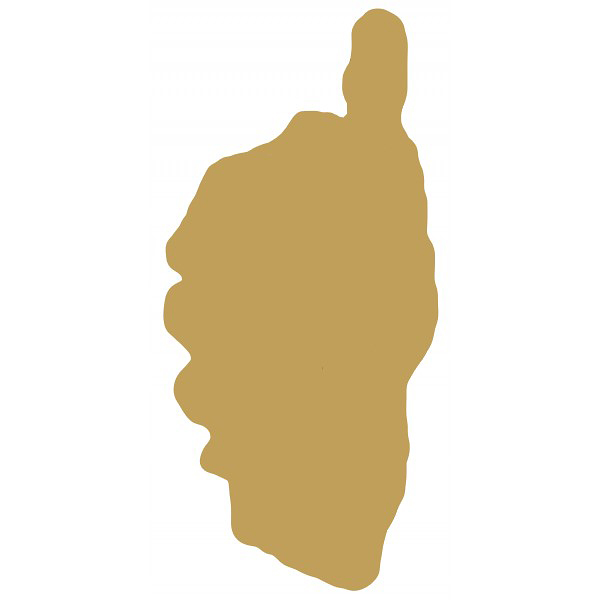
With its sublime beaches, majestic mountains, and rich historic heritage, Corsica encompasses all indispensable elements that make up the ideal holiday. This sought-after, void-of-mass tourism Mediterranean heaven has gained a reputation as an up-market spot favored by the rich and famous.
Indeed, Corsica is considered a relatively expensive travel destination with prices comparable to those in the South of France.
On the other hand, the island offers an incomparable diversity of charge-free attractions that include some of the world’s most renowned natural landmarks. Even on a budget, you may fully enjoy innumerable outdoor activities, delicious food and wine, and fascinating cultural treasures.
Read on to learn about the true costs of visiting the ‘Island of Beauty’ with many useful tips for an affordable holiday.
This page contains affiliate links meaning I get a commission if you decide to make a purchase through my links, at no extra cost to you. Click here to learn more.
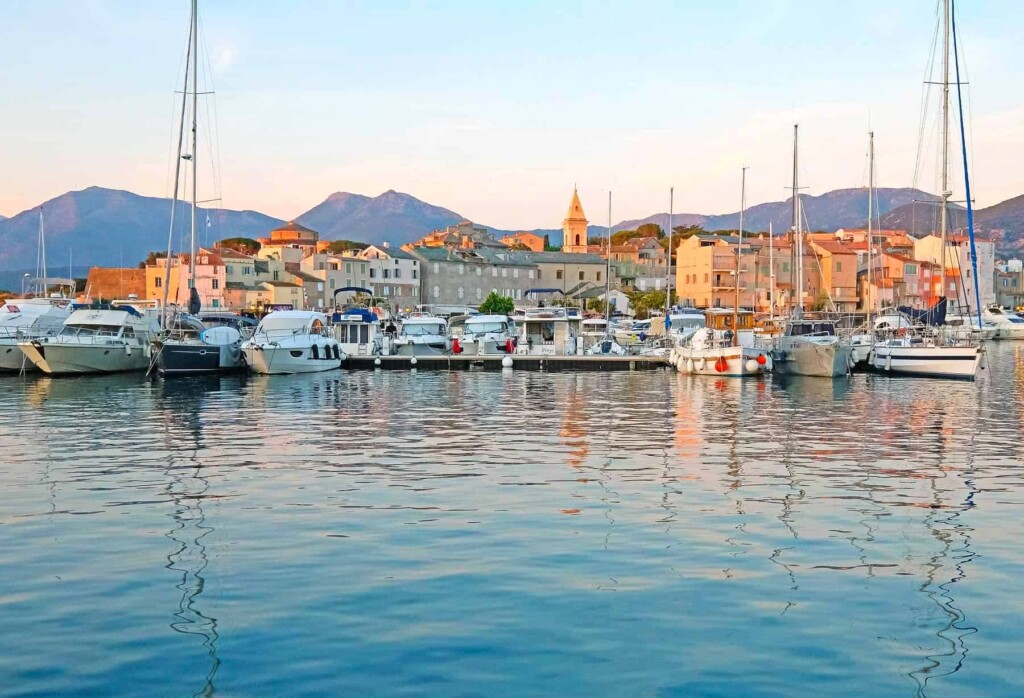
WHY IS CORSICA EXPENSIVE
- Being an island, Corsica relies on importing the majority of goods and supplies by air or sea. The inevitable impact of transport costs on commodities affects the end consumer.
- As the island’s economy relies heavily on seasonal tourism, the prices skyrocket in the summer months enabling the locals to earn their yearly livelihoods during the short tourist season.
- Traveling to Corsica involves either a ferry ride or a flight. A high seasonal demand paired with limited transport options facilitates premium rates of these essential services.
- Corsicans have succeeded in preserving the island from the surge of mass tourism securing it the status of a prestige travel destination. Taking pride in the territory’s unspoilt natural heritage they created a luxurious Mediterranean retreat popular among wealthy travelers and celebrities. Today, the National Park of Corsica covers 40% of the island’s area with eco-travel emerging as a growing trend.
- Whatever the season, Corsica offers a supreme quality of life where the beauty of the landscapes is matched by the island’s dynamic entrepreneurial and economic development. Seduced by its comforts, wealthy visitors often invest in secondary residences or rental properties within the picturesque shores thus inflating the prices of the local real estate.
- Corsica is a safe destination to visit ranking in the fourth position among the French regions. Compared to other parts of Europe, the crime rate is low, and walking alone at night does not pose much of a security risk. Petty crime is virtually non-existent granting peace and tranquility to fully appreciate the island’s bountiful attractions.

IS CORSICA MORE EXPENSIVE THAN MAINLAND FRANCE
Living costs in Corsica are on a par with those on the French Riviera with many other mainland destinations being cheaper than the Island of Beauty.
According to livingcost.org, Corsica ranks as the 6th most high-priced region in France, 1.07 times more expensive than the national average. Accommodation, travel, and groceries, indeed, come with a lofty price tag although the costs may vary considerably depending on the location.
On the other hand, the Corsicans enjoy a high quality of life where luxuries such as infinite sunny skies, mouthwatering local food, and liberal access to innumerable mesmerizing natural sites are guaranteed.
IS CORSICA EXPENSIVE COMPARED TO OTHER WORLD DESTINATIONS
Worldwide, Corsica is considered a moderately-priced destination with an average daily travel cost of €120-€130 including meals, accommodation, transport, and activities. Compared to other European regions the island stands out as a fairly pricey place to visit ranking within the top 50% of the most expensive places on the continent.
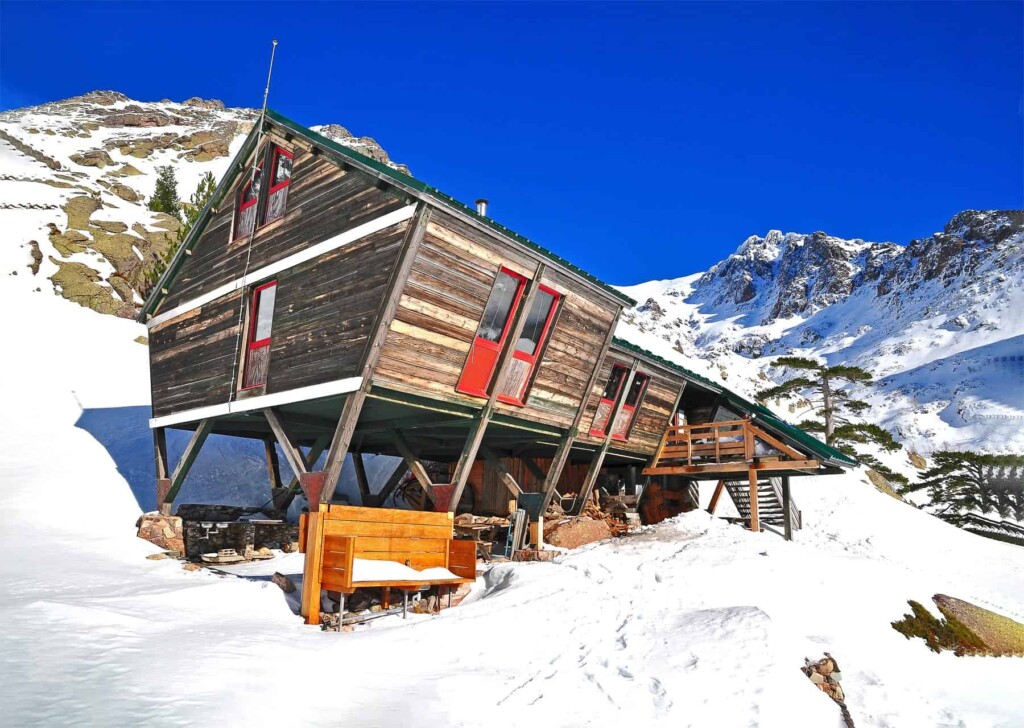
WHAT IS THE CURRENCY IN CORSICA
As France belongs to the Eurozone, the official currency used in Corsica is Euro (€). Cash payments remain the most widely used instrument of transition settlement.
French citizens are forbidden payments by cash of goods and services for a sum larger than €1000 (€3000 if you use e-money). This law does not apply to non-residents but you may be asked to share your address and identity presuming that a high sum of money is involved.
If you are a holder of a French bank account you may also use checks to pay for purchases which helps to avoid pricey fees charged for electronic bank transfers. You will also be asked to provide proof of identity such as your driving license or a passport. It is, however, a criminal offense to issue a check without sufficient funds in your account.
DO YOU NEED CASH IN CORSICA
Even though debit and credit cards are widely accepted and used in Corsica, you definitely need to carry some cash on hand when exploring the island.
Many small family-run businesses located in the isolated mountain locations still don’t accept bank cards. Likewise, simple hostels (gites d’etape) and hiking refuges dotting the Corsican trails often require cash-only payments for their basic yet difficult-to-upkeep services.
Coins and banknotes also come useful when tipping. If you wish to express your appreciation for a tasty meal or hospitable customer care you are welcome to leave a few euros as a sign of gratitude. It is worth noting, though, that tipping is neither mandatory nor expected in France.

CARDS AND ATMS IN CORSICA
Debit and credit cards are the most used cashless payment instruments in Corsica and are universally accepted in shops, bars, and restaurants. However, in more secluded locations there are still small businesses that operate on a cash-only basis.
To withdraw funds with your card, you may use ATMs (distributeur automatique de billets) available in cities and larger towns. To find one, look out for a bank branch or a post office agency. The word retrait indicates a withdrawal point. It is more difficult to come across an ATM in rural or remote locations.
Remember that French ATMs require a 4-digit PIN to withdraw cash therefore it is best to verify the passcode compatibility with your bank before you travel.
Withdrawals from ATMs belonging to banks different from the cardholder’s own may be subject to additional charges.
An online Visa or Mastercard ATM locator may be useful in finding the nearest cashpoint.
Names of the most popular banks in Corsica:
- BNP Paribas
- Crédit Agricole
- Société Générale
- Crédit Mutuel
- La Banque Postale

FOOD COSTS – LOCAL SPECIALTIES
Corsica has a long-standing tradition of authentic gastronomy where locally sourced fresh ingredients play the key role in creating mouthwatering dishes. Proud of their rich cuisine, the islanders devote much of their time, work, and resources to producing healthy, often organic delicacies.
Local specialties are expensive but definitely worth trying. Corsican olive oil, honey, cheese, or cured meats are some of the best in the Mediterranean.
Check the prices of popular Corsican products that will make a delicious (yet pricey) picnic basket to accompany your Corsican adventure :
| FOOD ITEM | QUANTITY / WEIGHT | PRICE (€) |
| Olive oil | 50cl | 14.29 |
| Honey | 250g | 9.42 |
| Fig jam | 350g | 3.49 |
| Biscuits Canistrelli | 200g | 4.50 |
| Cheese sheep’s milk | 400g | 12.52 |
| Cheese Tomme | 220g | 6.60 |
| Cheese Brocciu | 500g | 7.99 |
| Lonzu | 450g | 12.11 |
| Figatellu | 320g | 7.02 |
| Coppa | 360g | 8.83 |
| Beer Pietra can | 50cl | 2.30 |
| Wine Red | 75cl | 10.60 |
FOOD COSTS – DAILY GROCERIES
If you decide to prepare your meals at home, the average daily cost of food will set you back €30-€40. Cooking with artisanal ingredients acquired in designated Corsican sections of the supermarket will considerably hike the value of your menu.
The main supermarket chains in France are Auchan, Leclerc, Carrefour, Casino, and Hyper U. The isles are very well stocked offering a wide selection of products. Big stores are usually situated outside of town within centre commercial.
Below you may examine mid-range food article prices sourced in a supermarket in Saint Florent, a popular seaside resort located on Corsica’s northern shore. The figures were updated in January 2024.
| FOOD ITEM | QUANTITY / WEIGHT | PRICE (€) |
| Butter | 250g | 2.40 |
| Olive oil | 75cl | 8.38 |
| Eggs | 10 | 3.41 |
| Bread | 300g | 1.55 |
| Milk | 1l | 2.06 |
| Cheese Gouda | 200g | 3.85 |
| Cheese Mozzarella | 125g | 1.59 |
| Yogurt Vanilla | 4x125g | 2.10 |
| Tomatoes Cherry | 250g | 4.78 |
| Salad Roquette | 175g | 2.57 |
| Potatoes | 2kg | 2.99 |
| Cucumber | 1 | 1.79 |
| Salmon | 250g | 8.08 |
| Sea Bass | 1kg | 16.90 |
| Turkey breast | 2 | 4.43 |
| Chicken thighs | 1kg | 9.30 |
| Wine Red | 75cl | 7.80 |
WHAT IS THE PRICE OF A RESTAURANT MEAL IN CORSICA
The price of a restaurant meal in Corsica depends on the standard of the venue as well as on its location.
- Simple snacks such as the Corsican Migliacci or a Panini available in a boulangerie may be purchased for under €10.
- A meal for two people in an inexpensive brasserie costs around €40-€50.
- A local pizza can be ordered for €12-€18.
- Mid-range restaurants offer a two-person dinner experience for €80-€100.
- Higher-end places serving sophisticated dishes charge from €150-€250 for a couple.
- Prices of lunch menus are more affordable than their dinner counterparts. They often include salads and light snacks.
- Drinks in Corsican restaurants are relatively expensive. A bottle of mineral water costs around €3-€5 while a cappuccino €3 or more.
- A bottle of wine starts at €15-€20. If you prefer a cheaper option order a carafe of local house wine.
- Complementary liqueurs are often served by the hosts at the end of the meal.

ACCOMMODATION COSTS
The prices of accommodation in Corsica vary depending on the type of lodging, its location, and the visiting season.
Hotels are generally the most expensive option whereas rental homes and apartments offer more affordable rates. If you are on a budget, consider a campsite or a hostel, both being a popular choice among hikers and young adventurers.
July and August are, by far, the priciest months when it comes to the accommodation costs in Corsica. Visiting the island outside the high season, you may save between 20-50% on your housing expenses. Spring and autumn offer sunny skies, pleasant seawater temperatures, and a crowd-free Corsican experience for an affordable price.
The location of your holiday home is another important factor when setting a budget for your vacation on the island. As a rule of thumb, coastal lets are more expensive than accommodation in the mountains and the interior where seasonal price variations are less prominent. The proximity of renowned Corsican landmarks and sights plays an equally important role in influencing the costs of holiday lets.
Where to stay in Corsica? Learn more…
Compare accommodation prices for two people per night within and outside the peak season in Corsica :
| ACCOMMODATION 2 PPL | PRICE (€) P/N HIGH-SEASON | PRICE (€) P/N OFF-SEASON |
| Hotel high-end | 250+ | 150-250 |
| Hotel mid-range | 150-300 | 80-150 |
| Hotel budget | 120-150 | 60-100 |
| Rental home / apartment | 120-300 | 60-150 |
| Hostel | 60-100 | 45-70 |
| Campsite | 50-120 | 30-50 |
LEISURE AND OUTDOOR ACTIVITIES COSTS
The best thing about visiting Corsica is that the majority of its attractions may be explored completely off-charge and its famous natural sights are accessible to anyone in a reasonable physical shape. A multitude of scenic hikes, ravishing waterfalls, heavenly beaches, and imposing mountains are always around the corner no matter where you decide to set up your base.
Having said that, an impressive line-up of leisure activities and outdoor pursuits allows you to fill each day of vacation with an exciting adventure.
Examine the approximate costs of Corsica’s key attractions in the table below :
| ACTIVITY | DURATION / QUANTITY | PRICE (€) |
| Visit to museum | 1 ticket | 5-10 |
| Wine tasting tour | winery visit + tastings | 15-120 |
| Boat trip | diverse boat tours | 35-145 |
| Canyoning | ½ day river hike | 40-65 |
| Diving | 1 dive | 50-60 |
| Kayaking | ½ day | 35 |
| Jet-skiing | 30 min / 2ppl | 70-90 |
| Paddling | ½ day | 40 |
| Horse riding | 2 h | 60-90 |
| Donkey riding | 1 h | 20-35 |
| Paragliding | tandem flight | 90-185 |
| Quad biking/4WD ride | ½ day excursion | 90-110 |
| E-Biking | 1 day | 40-45 |
| Via Ferrata | ½ day adventure | 30-50 |
| Golf | 9 holes | 45-98 |
| Hiking guide | ½ – 1-day excursion | 40-150 |
LOCAL TRANSPORTATION COSTS
Transport costs make up a large part of all travel expenses when visiting Corsica with an average daily expenditure reaching €50-€60.
Domestic public transport options are very limited with trains and busses serving only the key destinations of the island. Tickets, on the other hand, are inexpensive and oscillate around €10-€26 depending on the route. The train connecting Ajaccio-Bastia and Ajaccio-Calvi will cost you between €21-€26. Rates for the bus rides are comparable.
For public transport timetable and tariffs consult the following websites: trains- https://cf-corse.corsica/horaires/, buses- https://www.corsicabus.org/connectionsHiking.html.
How to get around Corsica? Learn more…
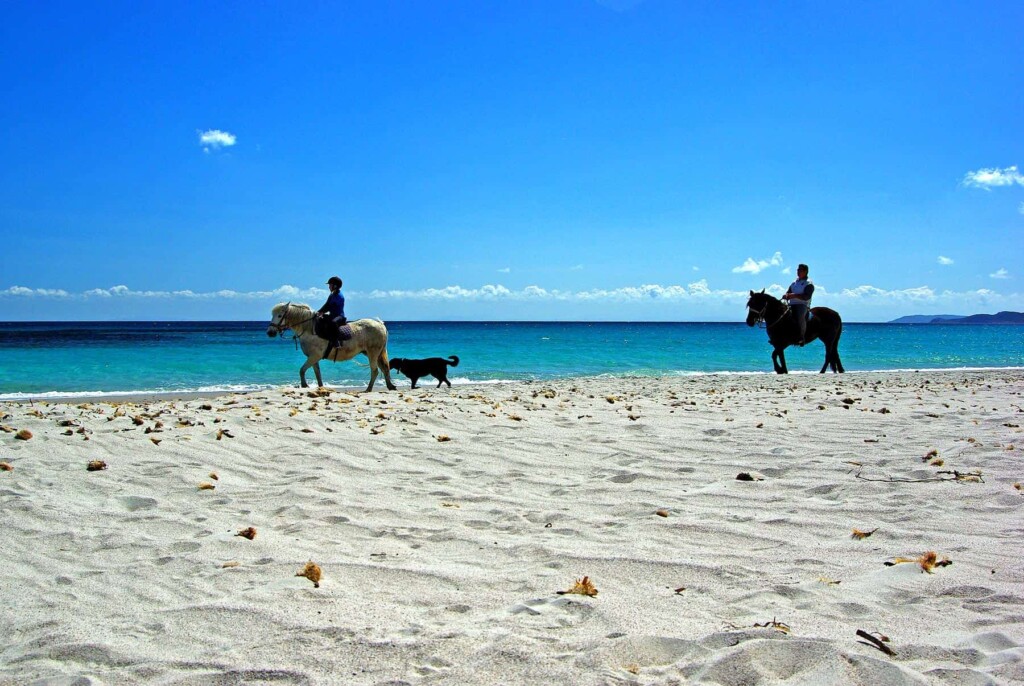
TAXI SERVICE COSTS
Local taxi services and private drivers are pricey. Fares for the Bastia center- Bastia Poretta airport journey (20km) start at a lofty €40-€50, compared to the €10 bus shuttle ticket. A cab for the Ajaccio- Porticcio itinerary (66km) costs €100-€190 with rates going up to even €230 for a minivan.
Before booking your taxi, call several service providers to compare prices to find the best deal. Taxi Aéroport Poretta (https://www.corsica-taxis.com/) offers an online reservation tool with an automatic fare calculator.
FUEL COSTS
Using a car is, by far, the most convenient way to explore the Island of Beauty. Whether a rented vehicle or your own four wheels, you will be faced with considerable fuel costs during your stay. As Corsican roads are windy and narrow, your average speed will rarely exceed 35km/h decreasing engine economy.
Just as everywhere else, Corsican petrol prices have been fluctuating in recent years ranging from €1.80 to €2.00 per liter. Diesel tends to be marginally cheaper than gasoline although that sometimes changes. Most affordable fuel is sold by gas stations on the East Coast.
Here you may find useful tips for safe driving in Corsica with a list of the most beautiful scenic drives on the island.
How to get around Corsica? Learn more…

CAR RENTAL COSTS
As traveling by car allows freedom and convenience to explore the fascinating scenery of the island many visitors choose to hire a vehicle to get around its corners.
The easiest way to get a car is to pick it up at one of the four Corsican airports- Ajaccio, Bastia, Calvi, or Figari. You may also collect your vehicle in city centers.
The cost of renting a car in Corsica depends on the dates, the type of the car, the pick-up location, and the age of the driver. You may expect to pay between €60-€150 per day in low season and €90-€250 in the busiest summer months.
If you can, book early to find a car that best suits your needs as the demand in July and August skyrockets hiking up the prices.
How to get around Corsica? Learn more…
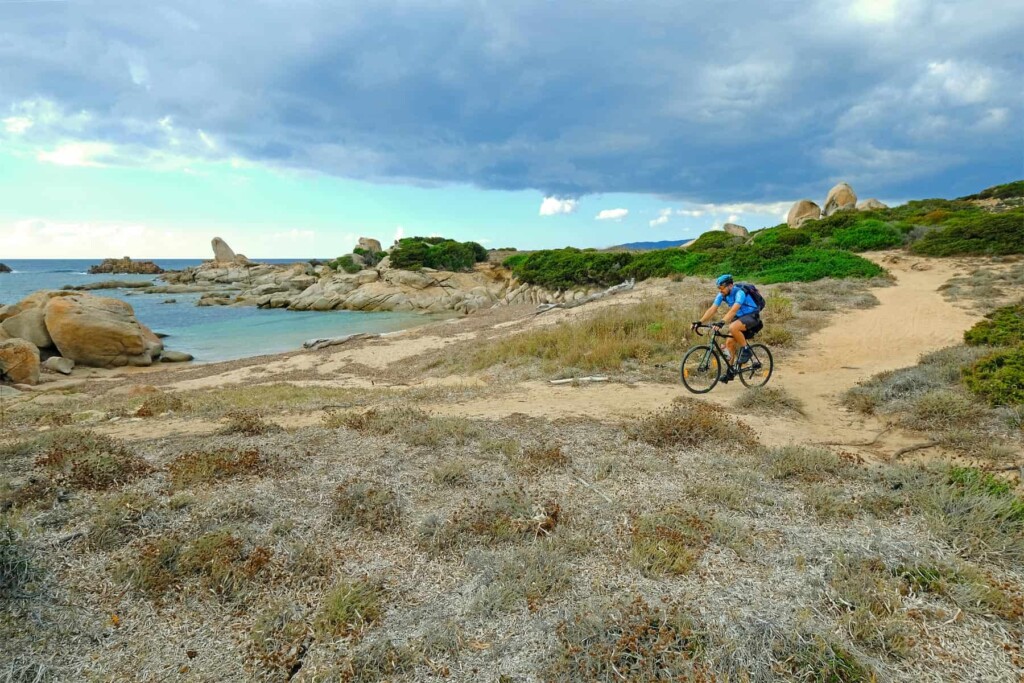
THE COST OF GETTING TO CORSICA
There are only two ways of getting to Corsica- by plane or aboard a ferry by sea. Both options are pricey and next to the cost of accommodation, constitute the largest portion of your trip’s primary expenses. Here you may learn how to travel to Corsica.
Depending on the season, day of the week, and travel mode, ticket prices fluctuate with the most expensive period falling in July and August. Choosing the right time to fly or sail may chip off up to 40% of travel costs.
The following table presents sample transport fares in and outside the busy season for a plane and ferries. Consider the difference in tariffs to best plan your holiday :
| TRANSPORT OPTION | PRICE (€) MAY 2024 | PRICE (€) AUGUST 2024 |
| Paris-Ajaccio return plane ticket, 1 person, sat-sat | 218.95 | 498.95 |
| Livorno-Bastia return ferry ticket, 2 ppl + car, sat-sat | 182.40 | 272.75 |
| Toulon-Bastia return night ferry ticket, 2 ppl + car + cabin, sat-sat | 449.00 | 771.00 |
| Marseille-Ajaccio return night ferry ticket, 2 ppl + car, sat-sat | 350.00 | 667.52 |
| Marseille-Ajaccio return night ferry ticket, 2 ppl + car + cabin sat-sat | 455.48 | 1118.52 |
| Marseille-Ajaccio return night ferry ticket, 2 ppl + car wed-wed | 303.48 | 506.48 |
| Marseille-Ajaccio return night ferry ticket, 2 pp + car + cabin, wed-wed | 392.48 | 680.48 |
USEFUL TIPS TO VISITING CORSICA ON A BUDGET
- Plan your trip early and carefully research destination costs. Corsica is an island with seasonal tourist demand which means price fluctuations will apply to almost all elements of your trip.
- Book your transport and accommodation in advance in order to find the best deals.
- Travel off-season. Verify and compare your travel options and if you can, avoid July and August when the prices skyrocket. Finding the right time to visit the island may significantly reduce your travel expenses.
- When taking a night ferry to access Corsica, forego a cabin. If you can withstand the lack of comfort and do with reclining seats or a hall sofa for one night, this can save you up to €250 per crossing.
- Book your planes and ferry rides for weekdays to avoid inflated Saturday tariffs.
- Choose wallet-friendly accommodation. Instead of staying in costly hotels consider going for a self-catering apartment, a hostel, or even a tent in one of the island’s innumerable beauty spots. Corsica’s relaxing, low-key atmosphere pairs perfectly with laid-back recreation in nature.
- Opt for holiday lets located further away from the coast. Rentals set back from the beach are generally more affordable.
- Decide your itinerary before your trip. Stay reasonable with your bucket list plans as it is impossible to experience all of Corsica’s attractions during one visit. Stick with what you had planned to avoid overspending.
- Prioritize low-cost or free activities. Most of Corsica’s tourist landmarks are accessible off-charge whereas entry tickets to museums and adventure parks are inexpensive. If you can splash out once or twice, be sure to set money aside for a boat trip to visit the Scandola Nature Reserve. Although highly priced, this extraordinary adventure is sure to grant you an unforgettable authentic experience.
- Arrive prepared. Consider your gear and equipment requirements in relation to your envisaged itinerary. Items such as a reusable water bottle with a filter or a backpack camera clip come in very handy on Corsican trails and may cost less when purchased in advance.
- Cook at home or choose simple brasseries to enjoy your meals. With the high prices of Corsican products, food can quickly become a substantial part of all travel costs. For gastronomy connoisseurs, grocery shopping can become a great cultural experience.
- Invest in travel insurance to avoid any unexpected expenses in case of emergency.
HELPFUL TRAVEL RESOURCES :
Please help support CoolCorsica!
If you find this website as useful as a guidebook you may have had to buy to plan your adventures, please consider helping me with a small donation.
This all-content traveler-focused site is created in my spare time with a desire to share comprehensive information, useful tips, and inspiring photos of Corsica’s most scenic locations.
Please note that certain products/services and links to products/services are affiliate links and I may earn a commission for any purchases that you make, at no additional cost to you. I truly appreciate your use of any of the links I share.
With your generous help, I can continue to offer my advice and support in planning your dream holiday.
Thank you for your contribution!
